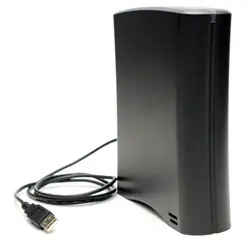You’re right. Surges happen and they can destroy drives. But personally, I leave my external drives plugged in all the time.
There are a few things to be aware of before doing that.
It’s all about the power source
The drive’s power source is perhaps the single biggest factor. If you plug the main 120- or 240-volt power into the external drive, then it actually has its own power supply inside. That puts it pretty close to the same risk as your desktop computer.
Most external drives don’t have a power supply. They usually have an external power “brick” that converts the main line power to something else that’s actually used by the drive. That process of converting that power acts as a nice buffer from many types of power problems.
Some have no power supply at all, drawing everything they need solely from the five volts provided by the USB interface.
In these cases, I’m actually not overly concerned about surges.
 Other risks
Other risks
Something certainly could happen, but I put the chances at very low.
The “Should I leave it plugged in all the time?” issue is really most often related to malware. If your external drive is connected and malware infects your machine, that drive could also get infected. This has nothing to do with power and power spikes; it has everything to do with software.
If the external drive actually never moves, then it’s still not something I’d worry about beyond making sure that my system as a whole is secure. If that drive travels from machine to machine, then maybe it’s worth a little extra thought. But even then, I’d still focus on keeping the system clear as a whole – where the side effect is that the external drive never gets infected.
The good news is that backup images from programs like Macrium (if that’s what the drive is used for) are typically not compromised.
 Other risks
Other risks
A UPS (Uninterruptible Power Supply) set up between the wall and the machine keeps the power on for a while in a blackout and cleans power spikes and drops coming through to the device to deliver power within acceptable ranges. It’s good insurance.
I was interested particularly in the last sentence of this article – that typically backup images are not compromised, and have a couple of questions.
*is this because the malware works by searching for specific file types and the backup file types are not in the list?
*as I understand from your articles on encryption that a complete disk can be encrypted rather than only some of the content, can an external hard drive being used for backup storage be so encrypted by malware?
It is because malware generally installs executable and sometimes auto-run files to the disk they are infecting. They can’t get into the backup image file and install these files there. This doesn’t mean that the virus can’t somehow corrupt the backup image and make it unreadable to the backup program. So there is a danger there.
Malware typically doesn’t understand the file format used by backup programs. They could damage a backup, along with other files, but they could not infect or insert their code into a backup in any way that is useful to the malware.
Yes, a complete disk could be encrypted. All files could be encrypted. Right now, though, when malware does the encryption thing they focus on only certain file types – many, but not all – specifically so that they don’t encrypt something that is required to keep Windows running. They need Windows running so they can post their demands. Backup images are not on their list – I suspect because they would take a long time to encrypt, and they’re not the “low hanging fruit” that malware authors go for.
I’m NOT saying that external backup drives can’t be harmed by malware – of course they can – so can network connected shares and the like on other machines. What I am saying is that it’s not typical and in the world of things to worry about it doesn’t rank highly. To me its more important to keep the entire machine safe and leave the drive connected so that your backups happen on schedule than it is to disconnect because you’re concerned that if the machine is compromised backups will be lost.
I have been using WD My Passport external HD for some years now, and a few weeks ago these files suddenly appeared on it. G:\fbff67a0c8dbb9715ad30472, looks like a cookie. I have tried to delete it, but cannot, not even one by one. I am a bit perturbed about it, need I worry?
Thanks
That’s this article: http://ask-leo.com/can_i_delete_these_randomly_named_folders.html